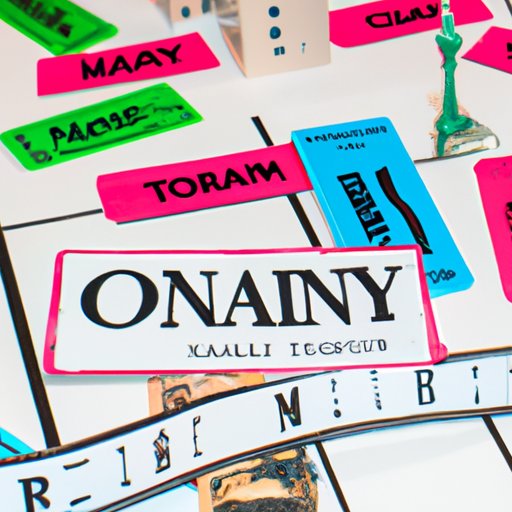Introduction
Monopoly has been an iconic board game for generations of families and friends. The classic game of wheeling and dealing involves buying and selling properties, acquiring wealth, and avoiding bankruptcy. But how much money does each player get when they first start playing?
The official rules of Monopoly state that each player starts with $1,500 in play money. This includes two $500 bills, two $100 bills, two $50 bills, six $20 bills, five $10 bills, five $5 bills, and five $1 bills. This money is used to purchase properties, build houses and hotels, and pay rent to other players.
In this article, we will explore how much money each player gets in Monopoly, as well as the strategies they can use to increase their funds. We will analyze the impact of bankruptcy on players’ funds, examine the effects of chance cards on money balances, compare Monopoly money across different versions of the game, and discuss the best ways to win by maximizing your funds.
Analyzing the Impact of Bankruptcy on Players’ Funds in Monopoly
One of the main aspects of Monopoly is the risk of bankruptcy. When a player goes bankrupt, they are eliminated from the game and must surrender all their assets to the other players. So what happens when a player goes bankrupt?
When a player is declared bankrupt, they must pay all their debts to the other players. If they are unable to pay these debts, then they must forfeit all their assets to the other players. This includes any properties, houses, hotels, and money they have in their possession.
Therefore, it is important for players to be strategic about how they manage their money in order to avoid bankruptcy. One way to do this is by avoiding any high-risk investments or purchases. It is also important to try and maintain a steady cash flow so that you always have enough money to pay rent or any other debts.
Exploring the Best Strategies for Increasing Your Monopoly Funds
There are several strategies that players can use to increase their funds in Monopoly. One of the most effective strategies is to utilize property rent as a source of income. By purchasing properties and building houses and hotels, players can collect rent from other players who land on their properties.
Another strategy is to invest in utilities and railroads. These properties generate a steady income for the owner, and are usually less expensive than other properties. Finally, players can use chance cards to their advantage. Certain chance cards can provide players with extra money or allow them to avoid paying rent.

Examining the Effects of Chance Cards on Monopoly Money Balances
Chance cards are an important part of the Monopoly game. They can have both positive and negative effects on players’ money balances. The most common chance cards are “Advance to Go”, “Pay Poor Tax”, and “Get Out of Jail Free”.
The “Advance to Go” card allows players to move directly to the “Go” space, where they receive $200. The “Pay Poor Tax” card forces players to pay a fee of $15 to the bank, while the “Get Out of Jail Free” card allows players to escape jail without paying a fee. Other chance cards may award money or require players to pay fees to other players.

A Comparison of Monopoly Money Across Different Versions of the Game
The standard Monopoly money system consists of two $500 bills, two $100 bills, two $50 bills, six $20 bills, five $10 bills, five $5 bills, and five $1 bills. However, there are variations in the amount of money given to players in different versions of the game. For example, in the Monopoly Junior game, players start with $500 instead of $1,500.
In addition, some versions of the game give out bonus money at the beginning of the game. For example, in the Monopoly Ultimate Banking Edition, each player receives a bank card and starts with $1,000. Throughout the game, players can use their bank cards to make transactions and track their money.

Exploring the Different Ways to Win a Game of Monopoly by Maximizing Your Funds
Winning a game of Monopoly requires a combination of luck and skill. Players need to employ strategies to accumulate properties, make wise investments, and utilize chance cards. One of the best strategies for increasing your funds is to focus on accumulating properties. This will allow you to collect rent from other players and increase your cash flow.
In addition, investing in utilities and railroads can be a good way to generate a steady income. Finally, chance cards can be used to your advantage. Certain chance cards can provide players with extra money or allow them to avoid paying rent.
Conclusion
In conclusion, Monopoly is a classic game of wheeling and dealing that involves buying and selling properties, acquiring wealth, and avoiding bankruptcy. Each player starts with $1,500 in play money, and there are various strategies they can use to increase this amount, such as utilizing property rent, investing in utilities and railroads, and making smart investments. Chance cards can also have both positive and negative effects on players’ money balances. Finally, winning a game of Monopoly requires a combination of luck and skill, and players must employ strategies to accumulate properties, make wise investments, and utilize chance cards.
By understanding the various ways in which players can maximize their funds in Monopoly, they can improve their chances of winning the game.
(Note: Is this article not meeting your expectations? Do you have knowledge or insights to share? Unlock new opportunities and expand your reach by joining our authors team. Click Registration to join us and share your expertise with our readers.)
